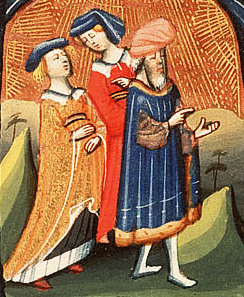 W
WSamuel is a figure who, in the narratives of the Hebrew Bible, plays a key role in the transition from the period of the biblical judges to the institution of a kingdom under Saul, and again in the transition from Saul to David. He is venerated as a prophet by Jews, Christians, and Muslims. In addition to his role in the Hebrew Scriptures, Samuel is mentioned in the New Testament, in rabbinical literature, and in the second chapter of the Qur'an. He is also treated in the fifth through seventh books of Josephus's Antiquities of the Jews, written in the first century CE (AD). He is first called the Seer in 1 Samuel 9:9.
 W
WElkanah was, according to the Books of Samuel, the husband of Hannah, and the father of her children including her first, Samuel. Elkanah practiced polygamy; his other wife, less favoured but bearing more children, was named Peninnah. The names of Elkanah's other children apart from Samuel are not given. Elkanah plays only a minor role in the narrative, and is mostly a supporting character to Eli, Hannah, and Samuel.
 W
WHannah is one of the wives of Elkanah mentioned in the First Book of Samuel. According to the Hebrew Bible she was the mother of Samuel.
 W
WPeninnah was one of Elkanah's two wives, briefly mentioned in the first Book of Samuel. Her name may derive from פְּנִנָּה (pəninnāh), meaning "coral".
 W
WThe Song of Hannah is a poem interpreting the prose text of the Books of Samuel. According to the surrounding narrative, the poem was a prayer delivered by Hannah, to give thanks to God for the birth of her son, Samuel. It is very similar to Psalm 113 and the Magnificat.
 W
WThe Tomb of Samuel, commonly known as Nebi Samuel or Nebi Samwil, is the traditional burial site of the biblical Hebrew and Islamic prophet Samuel, atop a steep hill at an elevation of 908 meters above sea level.
 W
WIn the Hebrew Bible, the witch of Endor is a woman Saul consulted to summon the spirit of prophet Samuel in the 28th chapter of the First Book of Samuel in order to receive advice against the Philistines in battle after his prior attempts to consult God through sacred lots and prophets had failed. The witch is absent from the version of that event recounted in the deuterocanonical Book of Sirach (46:19–20).